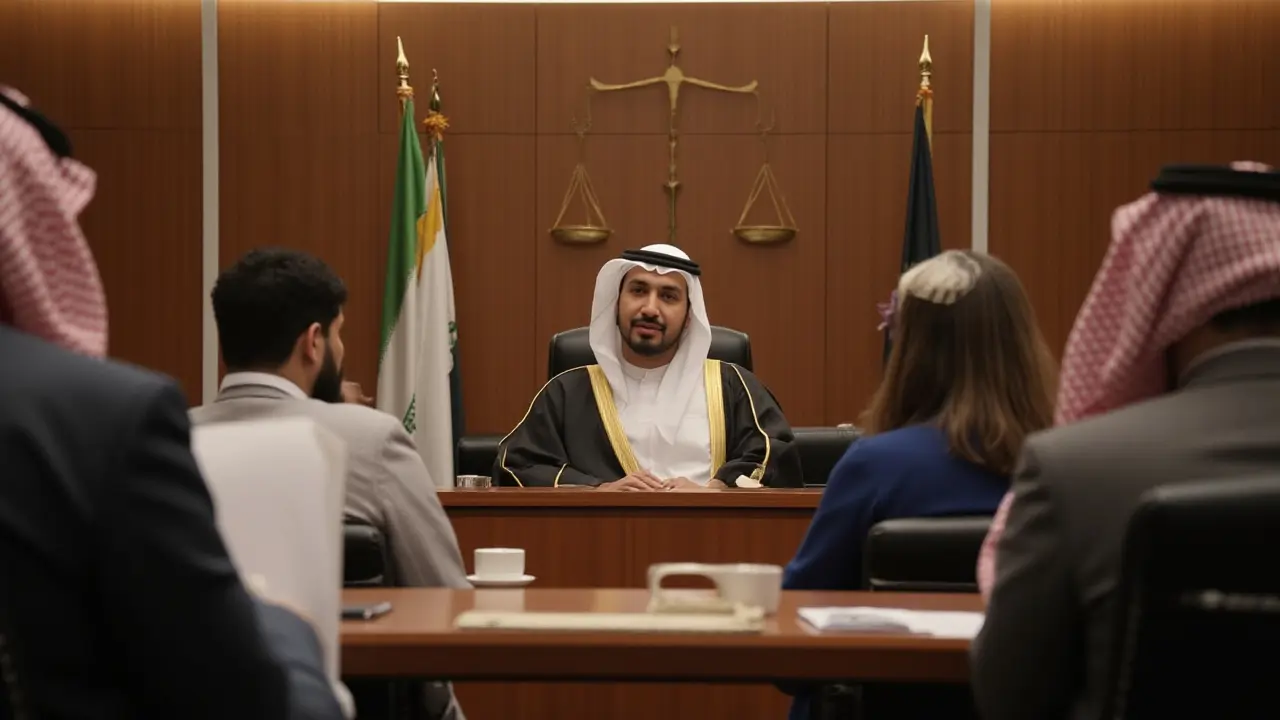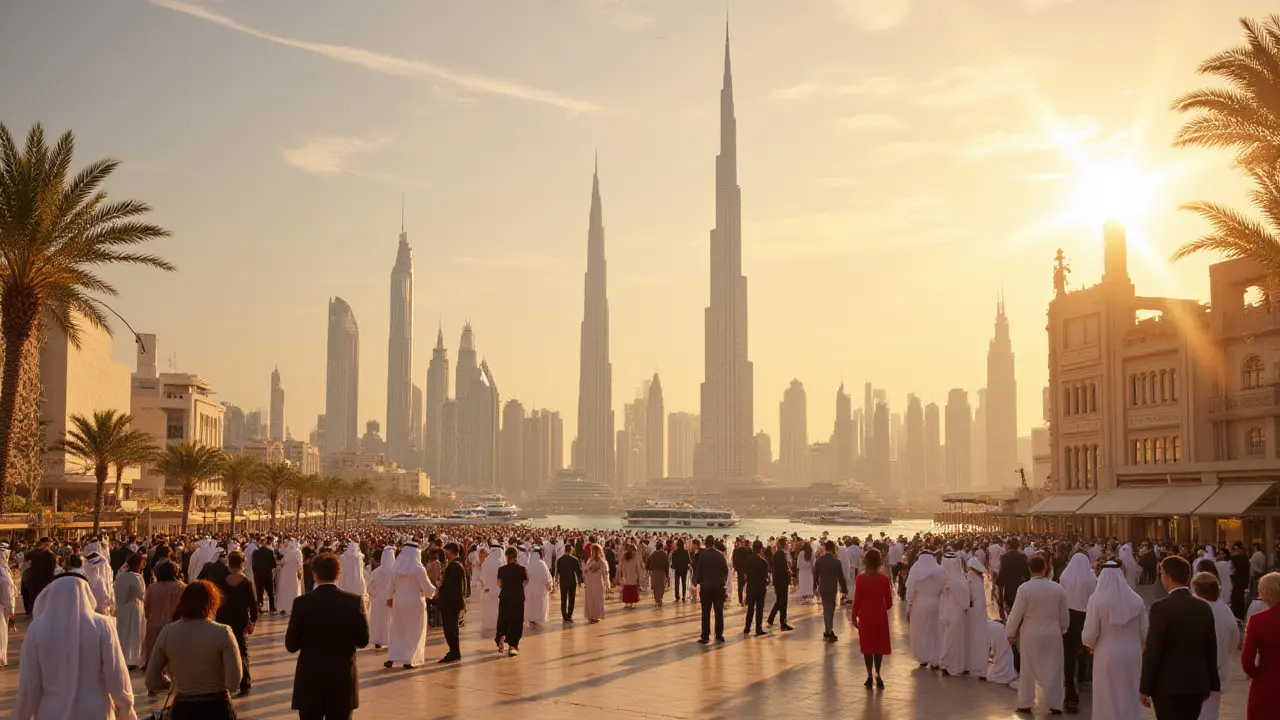Picture walking along Dubai’s glittering Marina, maybe checking out a rooftop brunch, all while wondering what rules actually shape daily life here. You hear about gold-plated Lamborghinis and sky-high towers, but lurking behind every travel forum and expat group is a single question: is Dubai under Sharia law? This isn’t just some technical matter for lawyers or politicians. Whether you’re planning a business trip, considering a move, or even just a wild adventure with your mates, you want to know—do Dubai’s famed rules come straight from religious law, and how much do they affect people like you and me?
Direct Answer: Is Dubai Under Sharia Law?
Let’s start with the straight-up answer: Dubai does follow elements of Sharia law, but it’s not as straightforward as you might think. The city operates under a mix of Islamic Sharia principles, UAE federal law, and various civil laws that often blend elements from both. Sharia has a major influence, especially in areas like family matters (marriage, divorce, inheritance), but the day-to-day legal system covers a lot more ground—with hefty tweaks and exceptions, particularly for the tens of thousands of expats and the steady stream of tourists flooding in every year. You’re not going to get thrown in jail for eating a bacon sandwich at the mall, nor will you be forced to cover your tattoos walking along JBR, but there are rules shaped by Islamic values. The easiest way to think about it: Dubai is a modern, international city on the Arabian Peninsula, threading a needle between tradition and global expectations.
Key Points about Sharia Law and Dubai
- Dubai’s legal system combines Sharia law, UAE federal law, and civil code.
- Sharia mostly influences family law (marriage, divorce, custody, inheritance).
- Criminal laws blend Sharia principles with secular rules, but are generally moderate for expats and tourists.
- Alcohol and pork are available for non-Muslims, but with licenses or restrictions.
- Public displays of affection, drunken behavior, and some dress codes are policed with Sharia-inspired guidelines.
Definition and Context: Unpacking Sharia Law in Dubai
So what do we even mean by Sharia law? At its roots, “Sharia” is the Islamic legal framework based on the Quran, sayings of the Prophet Muhammad (known as hadith), plus a few centuries’ worth of scholarly interpretation. In some countries, Sharia is the law. In others, it’s only part of the system. The UAE—including Dubai—sits in the middle. Federal law across the UAE is influenced by Sharia, especially for personal and family issues. Think of disputes over inheritance, who gets custody of children, marriage contracts, and divorce—they go to courts that use Sharia as a reference, especially for Emirati citizens and Muslim residents. Now, for commercial, employment, and most criminal matters, things get a lot more secular and modernized, using a civil law code inspired by Europe, mostly France and Egypt. Why does Dubai matter here? Because it markets itself as a cosmopolitan, tolerant playground for global business, travel, and pleasure, but it still holds tightly to Islamic values—some visible everywhere, some barely felt. It’s a balancing act. For example, during Ramadan, you’ll see eating and drinking (even water!) banned in public daylight hours out of respect for Muslim fasting. On the flip side, you can still catch happy hour with a glass of wine after sunset in a flashy hotel bar.
How Sharia Law Affects Daily Life in Dubai
Here’s where things get interesting, and sometimes confusing. Expats and visitors make up nearly 90% of Dubai’s population, so the way laws are enforced can depend on your passport and your behavior. If you’re Muslim, especially Emirati, courts will often apply full Sharia principles, especially when it comes to family matters—who you can marry, what happens if you divorce, how your estate is divided, and so on. Non-Muslims, though, get a lot more flexibility. If you’re Christian or Hindu, for instance, you can marry under your own faith’s rules and those can be recognized, with most countries smoothing the process with their embassies. Same with inheritance: Expat wills can specify their home country’s rules will apply, as long as you sort out the paperwork in advance. Criminal law is more mixed. Theft, assault, alcohol violations, drugs—all these are policed with strictness that is more about order and public decency than religious punishment. Dubai has major zero-tolerance policies on drugs: possession, even of a small amount, can mean years in jail or even a life sentence. Alcohol is another example—while it’s available in hotels, bars, and certain clubs (for non-Muslims with a license), drinking in public or being visibly drunk on the street is a fast ticket to a police cell. The rules on relationships catch out travelers a lot: While it’s no longer an automatic crime for unmarried couples to share a hotel room (thanks to changes in the law in 2020), public displays of affection can still get you a warning, or sometimes a fine. And don’t be surprised if you see the occasional news headline about folks getting in trouble for an accidental peck or even a raunchy WhatsApp message that comes to the wrong person. Dubai isn’t about harsh religious enforcement, but about harmony, image, and public decency, filtered through an Islamic lens.

Benefits and Challenges of Dubai’s Legal System
Why run things this way? Dubai’s legal mix is one reason the place feels both safe and open, yet respectful and orderly. The city sits in a region with roots deep in tradition and faith—and doesn’t try to hide it. Yet, business deals zip through the DIFC and tourists’ wallets keep the hotels humming.
- Safety: Dubai consistently ranks as one of the world’s safest cities. You’ll see kids playing in parks late, people leaving bags on café tables, and a general atmosphere of “it just works.” That’s partly because penalties can be strict for theft, drugs, and any behavior seen as threatening public order.
- Predictability: Legal requirements can sometimes feel rigid, but you rarely see “grey areas” in criminal matters. The rules are clear (just read the massive signs in every airport baggage area spelling out penalties for drugs and misbehavior), and enforcement is usually swift.
- Protection: Family law’s Sharia influence gives Emiratis and Muslim expats assurance their rights and traditions are preserved, including protection for women and children in areas like divorce and inheritance.
- Challenge for Westerners: Some customs can catch newcomers off guard—dress codes in malls, rules around photos, or what counts as “offensive gestures.” A cheeky joke at a pub can end up a police report if it crosses into blasphemy or offends someone’s faith.
- Legal uncertainty for business: Businesses sometimes face headaches over commercial disputes, contracts, or debt, as local and federal rules can clash, and Sharia influences certain banking and finance laws.
Living and Visiting Under Dubai’s Sharia-Influenced Laws: Tips and Insights
Right, so how do you actually stay out of trouble and get the best out of Dubai’s legal system? Here’s the secret: don’t come expecting Paris or Vegas, but don’t fear you’ll land in trouble if you mind your manners and respect local ways.
- Keep public behavior PG. A peck on the cheek is one thing, but full-on make-out sessions in public are risky.
- Alcohol is for non-Muslims, but only in licensed venues; no wandering around with a pint or acting rowdy in public spaces.
- Dress codes are real in malls, public buildings, and mosques. Shoulders and knees covered works, especially for women, but the city’s public beaches are pretty relaxed.
- Ramadan: no eating, drinking, or smoking in public during daylight for a month. Private hotel restaurants still serve behind closed doors.
- Drugs are a complete no-go, including some prescription meds banned in other countries (always check before arriving).
- Social media or WhatsApp “jokes” that mention religion or politics can land you a fine, or worse—stick to sharing your poolside selfies.
- Regarding tattoos and piercings, there’s no outright ban, but avoid anything with religious symbolism on display.
- LGBTQ+ travelers need to be discreet. Laws prohibit same-sex relationships, though in reality enforcement focuses on public displays and activism.
The big surprise for many is that you don’t feel like you’re under surveillance, nor do everyday conversations revolve around religious rules. You’ll find people from just about every background living side by side—united by the same common sense that makes Bristol, London, or Toronto work, with a dash more modesty and formality. If you’re ever uncertain, ask! Hotel staff and expat groups are usually happy to clarify what’s okay and what’s not for your specific situation. Local apps like Dubai Police Smart App are handy for checking rules or even paying fines online. The rules may feel strict in places, but they create a buzzing, dynamic city that works remarkably well for the majority who follow them.
Comparison Table: Dubai’s Sharia-Influenced Law vs. Western Law
| Category | Dubai (Sharia-Influenced) | Western Cities (e.g., London, NYC) |
|---|---|---|
| Alcohol Laws | Allowed with license, only in certain venues, zero tolerance for public drunk behavior | Generally available; public consumption often legal |
| Drugs | Zero tolerance, harsh penalties even for small amounts | Small amounts of some drugs decriminalized in some cities |
| Family Law | Sharia-based for Muslims; civil or home-country law for non-Muslims (if paperwork exists) | Civil family law; religion typically separate |
| Public Decency | Strict rules on dress, affection, and language | More relaxed in public; fewer restrictions |
| LGBTQ+ Rights | Relationships illegal; enforcement varies | Legal in most Western cities, anti-discrimination laws exist |
| Business Law | Blend of civil and Sharia-based finance; foreign ownership restricted in some areas | Secular, open commercial codes; few religious finance rules |
FAQ: Your Questions About Dubai and Sharia Law Answered
- Is Sharia law enforced on tourists in Dubai? Not fully. Tourists mostly encounter public decency and alcohol rules. Avoid drugs, public drunkenness, and PDA.
- Can I wear a bikini on Dubai’s beaches? Yes, on public beaches and pools; just cover up when leaving these areas to hit the shops or hotels.
- Is alcohol really available in Dubai? Yes, in most hotels, bars, and clubs with the right license. Don’t drink in public places or drive after drinking.
- What happens if I break a Sharia-influenced law in Dubai? For minor stuff: fines or warnings. Serious stuff (drugs, assault): expect jail and possible deportation.
- How do family laws work for expats? Register your will or marriage under your home country’s system if possible. If not, Sharia may be applied by default.
Tempted to see what makes Dubai so unique? With a little respect and a curious mind, you can dive into its buzzing culture, luxurious lifestyle, and legendary hospitality without worry. Need more info? Hit up expat forums, travel blogs, or even chat with locals—you’ll discover Dubai is not just about rules, but about welcoming you into its dazzling reality.
